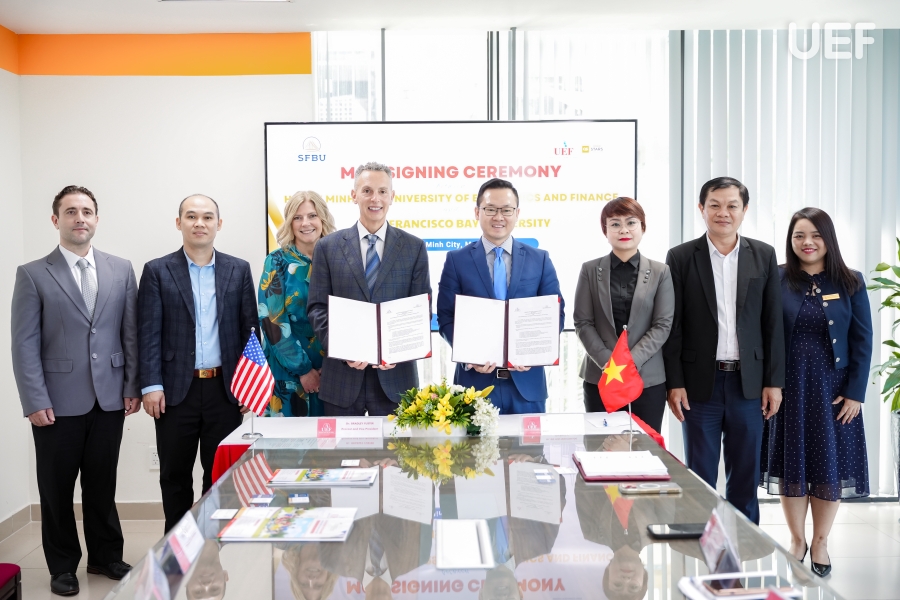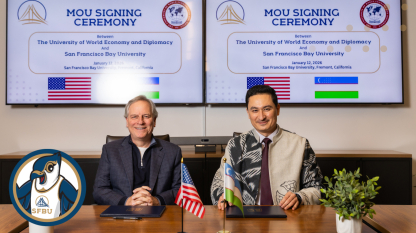
This summer, Provost and Vice President for Academic & Student Affairs, Brad Fuster, and Assistant Provost for International Programs, Jen Alessi, traveled to Indonesia, Vietnam, and Thailand, resulting in the signing of over 20 Memorandums of Understanding (MOUs) with partner universities across Southeast Asia. These agreements lay the groundwork for a globally connected future in higher education, reflecting SFBU’s commitment to eliminating barriers to education and creating new opportunities for international students to earn American degrees while remaining in their home countries.
This all started when Fuster and Alessi joined hands with QASPIR, an international organization focused on higher education and transformative learning, to search for the right partners to bring Silicon Valley-based education to a broader audience. Indonesia stood out immediately–not only for its scale, with over 4,000 universities in the country and 147,000 students represented through this initiative—but also because of a significant gap in access to U.S. credit-bearing programs.
In partnership with QASPIR, Indonesian students will take 30 credits from SFBU asynchronously, while transferring in 90 credits from their home university. Students will graduate with degrees from both their home university and SFBU. “Indonesia’s Ministry of Education, Culture, Research, and Technology has endorsed this program,” Fuster shared, highlighting the unique value of this partnership. With this initiative, SFBU becomes one of only two U.S. institutions providing this type of international degree pathway in Indonesia.
Furthermore, these partnerships remove logistical and financial hurdles for the students. “What I’m excited about,” Alessi explains, “is that students won’t need to get visas or worry about housing costs. We’re bringing education to them, right where they are.” SFBU will begin by offering programs in computer science, with the goal of expanding into business administration and other disciplines in the near future. Students will be able to complete coursework virtually in just one year, and have the opportunity to attend summer sessions in the U.S. to enrich their learning experience.
SFBU has already begun preparing for the first cohort of students to begin classes in Fall 2025. “We hired an instructional design team, implemented AI-powered video lectures, appointed a new Assistant Registrar, and reconfigured the Student Information System,” Fuster states.
Additionally, Subject Matter Experts are condensing 16-week courses into 8-week formats without compromising quality. Students will take major-specific courses alongside SFBU’s student-centric core curriculum, the Agility Praxis Pathway (APP), which explores life’s most pressing questions while building durable, career-focused skills.
Fuster and Alessi bring years of shared experience to this work, having previously collaborated on international partnerships in Asia. Their relationship-driven approach is central to SFBU’s global strategy. “When working with international partners, it’s all about building relationships,” Alessi shares. “You have to understand students’ needs and link common goals to create win-win opportunities. We are passionate about accessible education, and we will meet students where they are. International universities want to know they are partnering with an institution they can trust–one that is accredited, hands-on, and committed to high standards.”
Cultural sensitivity is another cornerstone. SFBU is committed to designing culturally appropriate coursework and building mutual understanding between international students and SFBU’s diverse campus community. “We want to understand others’ culture better so our classes reflect intercultural humility and culturally appropriate references,” Fuster says, emphasizing the importance of cross-cultural exchange not just for students, but for faculty and staff as well.
“SFBU is a challenger brand that thinks outside the box,” Alessi reaffirms. “Partnering with us means breaking down barriers so students can earn an American degree in an affordable, accessible, and personalized way. Every student’s journey matters, and every student counts.”
The trip culminated in the signing of MOUs in Indonesia, Thailand, and Vietnam. More importantly, it marked the beginning of long-term, trust-based relationships with institutions abroad—and a major milestone in SFBU’s vision to deliver transformative, globally accessible education.
Learn more about how these global partnerships align with San Francisco Bay University’s strategic plan.


